Is V Energy Drink Bad for You? The Real Effects on Your Body
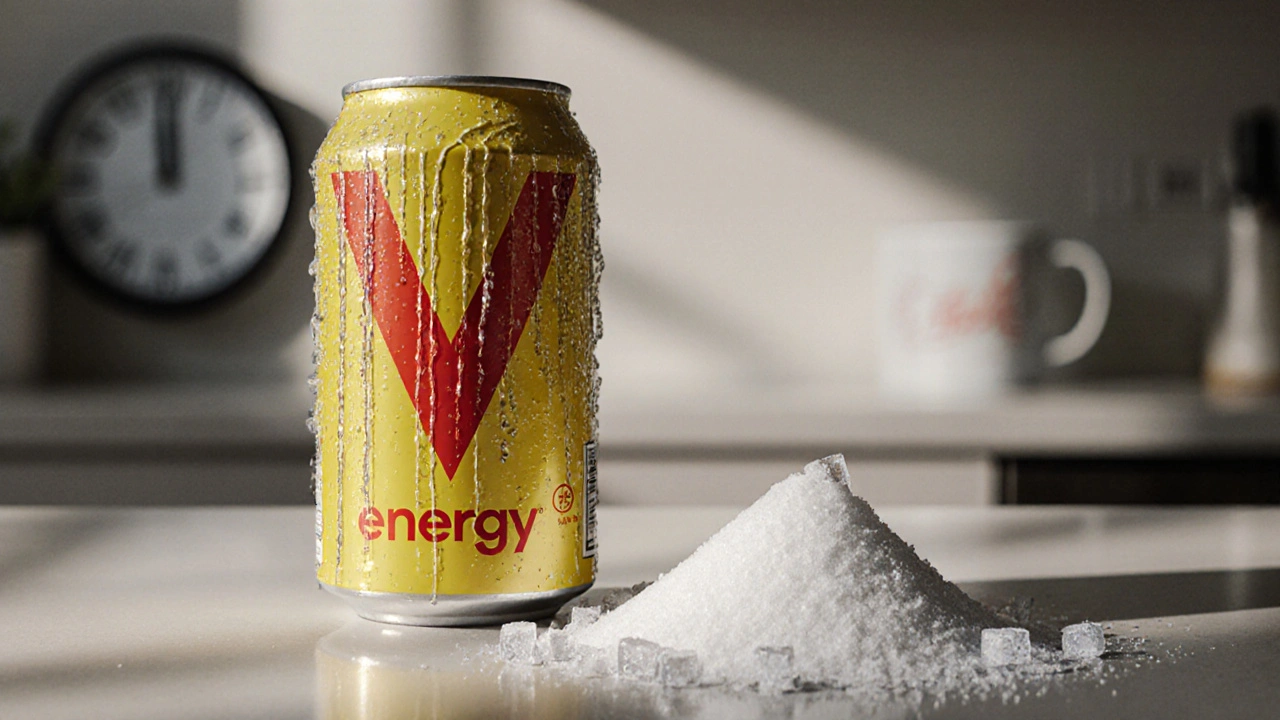
Every time you crack open a can of V energy drink, you’re not just grabbing a quick boost-you’re swallowing a cocktail of caffeine, sugar, and synthetic additives. And while it might feel like a harmless pick-me-up after a late night or a long shift, the long-term effects on your body are anything but simple.
What’s Actually in V Energy Drink?
V energy drink, sold mostly in Australia and New Zealand, comes in several versions, but the original 250ml can contains:
- 32 grams of sugar (about 8 teaspoons)
- 32 mg of caffeine per 100ml, so roughly 80 mg total per can
- Added B vitamins (B3, B6, B12)
- Artificial colors like Tartrazine (Yellow 5) and Allura Red (Red 40)
- Preservatives like sodium benzoate
That sugar amount? It’s more than half the daily limit recommended by the World Health Organization for added sugars. And while 80 mg of caffeine isn’t extreme-coffee lovers get that from a single cup-it’s still enough to spike your heart rate, raise your blood pressure, and mess with your sleep if you’re sensitive.
What’s worse? Many people don’t realize they’re drinking more than one can a day. Two cans? That’s 64 grams of sugar and 160 mg of caffeine. Three? You’re flirting with the upper safety limit for caffeine in a single sitting.
How V Energy Drink Affects Your Blood Sugar
That 32 grams of sugar doesn’t just disappear. It hits your bloodstream fast-faster than a candy bar-because it’s mostly high-fructose corn syrup and sucrose. Your pancreas responds by dumping insulin to clear it out. Then, just as quickly, your blood sugar crashes. That’s the crash you feel an hour later: tired, irritable, hungry.
This rollercoaster isn’t just annoying-it’s dangerous over time. Repeated spikes and drops in blood sugar increase your risk of insulin resistance, a key step toward type 2 diabetes. A 2023 study in the Journal of the American Heart Association found that people who drank one or more sugar-sweetened energy drinks per day had a 26% higher risk of developing type 2 diabetes than those who didn’t.
And no, the "zero sugar" version of V doesn’t fix this. It swaps sugar for artificial sweeteners like sucralose and acesulfame K. Those don’t raise blood sugar, but they also don’t help your gut microbiome. Studies show artificial sweeteners can still trigger insulin responses and may even increase cravings for sweet foods.
Heart and Blood Pressure: The Silent Risks
Every time you drink V, your heart rate goes up. That’s the caffeine. In healthy adults, that’s usually harmless. But if you have an undiagnosed heart condition, or if you’re mixing it with alcohol or stimulants like Adderall, the combination can be dangerous.
Between 2019 and 2024, the U.S. Food and Drug Administration received over 300 reports of adverse events linked to energy drinks-including palpitations, chest pain, and even cardiac arrest in young adults with no prior history of heart disease. While not every case involved V specifically, the pattern is clear: energy drinks are not benign.
Even one can can raise systolic blood pressure by 10-15 mmHg for several hours. That’s not a big deal once in a while. But if you’re drinking it daily, especially if you’re under stress or sedentary, you’re putting constant strain on your cardiovascular system.
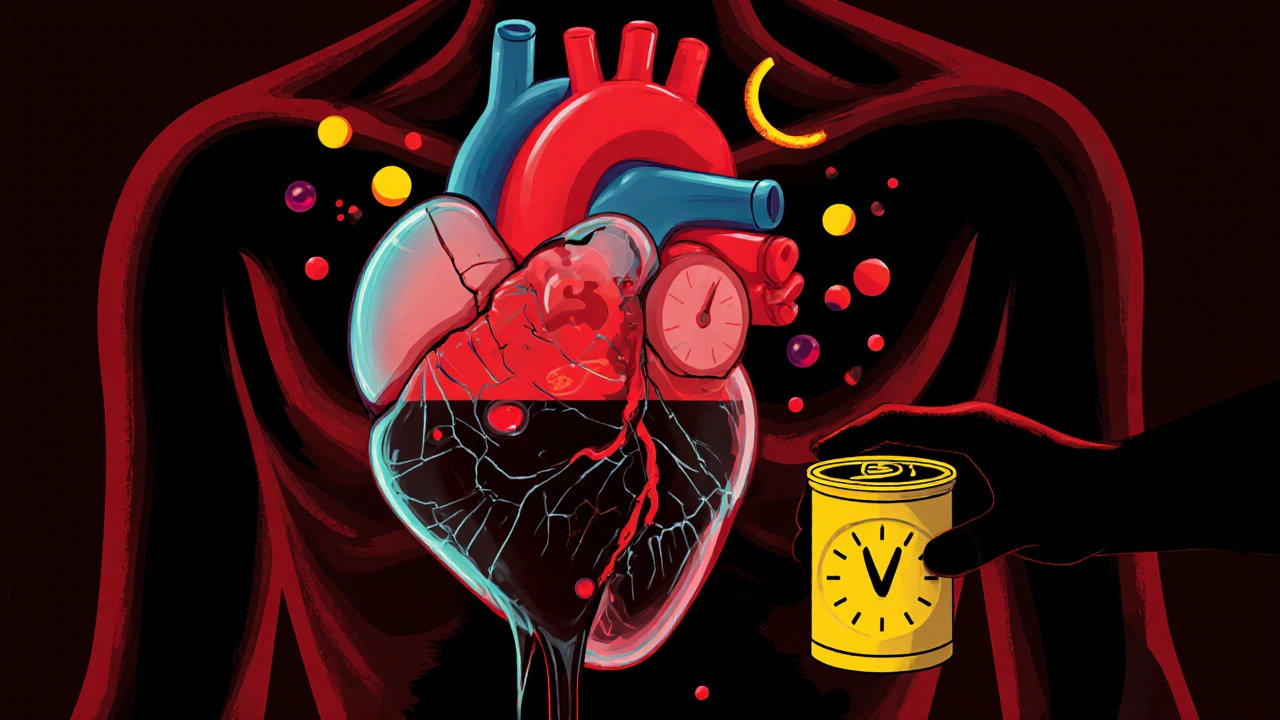
Teeth, Sleep, and Mental Health
Your teeth don’t stand a chance. V energy drink is acidic (pH around 3.3), which means it erodes enamel. Combine that with the sugar, and you’ve got a perfect storm for cavities. Dentists in Australia report a 40% increase in severe tooth decay among teens who regularly drink energy drinks over the last five years.
Then there’s sleep. Caffeine has a half-life of about five hours. That means if you drink V at 4 p.m., half the caffeine is still in your system at 9 p.m. You might fall asleep, but your deep sleep will be shallow. Over time, poor sleep worsens anxiety, reduces focus, and increases cravings for more sugar and caffeine-a vicious cycle.
And anxiety? Studies show that people who drink energy drinks daily are twice as likely to report symptoms of depression and anxiety. It’s not that caffeine causes depression-but it can trigger panic attacks in people prone to them, and the crash that follows leaves you feeling worse than before.
Who Should Avoid V Energy Drink?
Some people should never touch it:
- Children and teens: Their brains and hearts are still developing. The American Academy of Pediatrics says energy drinks have no place in a child’s diet.
- Pregnant women: High caffeine intake is linked to low birth weight and preterm birth.
- People with heart conditions: Even mild arrhythmias can be worsened by energy drinks.
- People on antidepressants or stimulants: Mixing caffeine with these drugs can cause dangerous spikes in blood pressure or serotonin levels.
- Anyone who drinks more than one can a day: The risks rise sharply with frequency.
Even healthy adults aren’t immune. If you’re using V to get through the day instead of fixing your sleep, diet, or stress levels, you’re treating the symptom-not the cause.
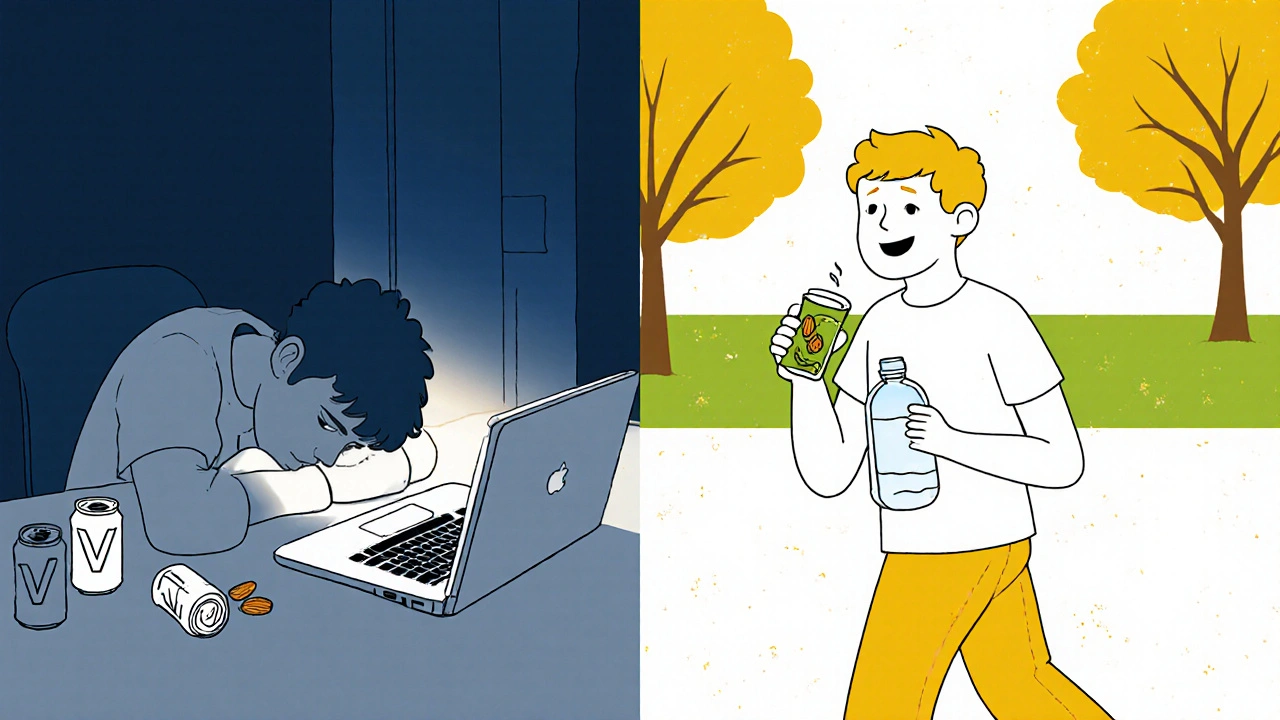
What Are the Alternatives?
You don’t need a can of V to feel energized. Real energy comes from:
- Water: Dehydration is the #1 cause of afternoon fatigue. Drink a glass before reaching for the can.
- Green tea: Has about 30 mg of caffeine plus L-theanine, which smooths out the jitters and improves focus without the crash.
- Black coffee: No added sugar, no artificial colors. Just pure caffeine-and you control the strength.
- Protein-rich snacks: A handful of almonds or a hard-boiled egg gives steady energy without spikes.
- 10-minute walk: Movement boosts oxygen flow and wakes up your brain faster than any drink.
If you need flavor, try sparkling water with a splash of lime or a few drops of stevia. You’ll save hundreds of calories and avoid the chemical aftertaste.
Final Verdict: Is V Energy Drink Bad for You?
Yes-especially if you drink it regularly, or if you’re under 18, pregnant, or have any underlying health issues. One can now and then won’t kill you. But treating it like a daily habit? That’s like brushing your teeth with sand. It might feel like it’s working, but it’s slowly destroying what you’re trying to protect.
The energy you get from V isn’t real energy. It’s a chemical trick. Real energy comes from rest, movement, hydration, and good food. Stop buying the illusion. Your body will thank you.
Is V energy drink worse than Red Bull?
V energy drink has slightly less caffeine than Red Bull (80 mg vs. 80 mg in a 250ml can), but it has more sugar (32g vs. 27g). Both contain artificial colors and preservatives. Neither is healthy for daily use. If you’re choosing between them, Red Bull has slightly fewer additives, but the difference is minimal. Neither should be a regular part of your diet.
Can V energy drink cause weight gain?
Yes. One can of V has 135 calories-almost entirely from sugar. Drink two a day, and you’re adding 270 extra calories. That’s over 1,800 extra calories a week. Without changing anything else, that’s about 1.5 pounds of fat gain per month. Even if you don’t gain weight, that sugar still causes fat buildup around your liver and organs, which is just as dangerous.
Is the zero-sugar version of V healthier?
It’s better for your waistline, but not necessarily for your health. Zero-sugar V replaces sugar with artificial sweeteners like sucralose and acesulfame K. These don’t raise blood sugar, but they can alter gut bacteria and increase sugar cravings. Some studies link them to headaches and digestive issues. The artificial colors and preservatives are still there. So while you avoid sugar, you’re still consuming a highly processed drink with no nutritional value.
Does V energy drink help with workouts?
It might give you a short-term mental boost, but it doesn’t improve performance. The sugar and caffeine can make you feel more alert, but they don’t provide real fuel. For exercise, water, electrolytes, and a small snack with carbs and protein work better. Plus, the diuretic effect of caffeine can lead to dehydration during workouts, which hurts performance more than it helps.
How long does V energy drink stay in your system?
Caffeine from V peaks in your blood within 30-45 minutes and has a half-life of about 5 hours. That means after 5 hours, half the caffeine is still in your body. After 10 hours, about 25% remains. For some people-especially those with slow caffeine metabolism-it can take up to 12 hours to fully clear. That’s why drinking V after 2 p.m. can ruin your sleep.


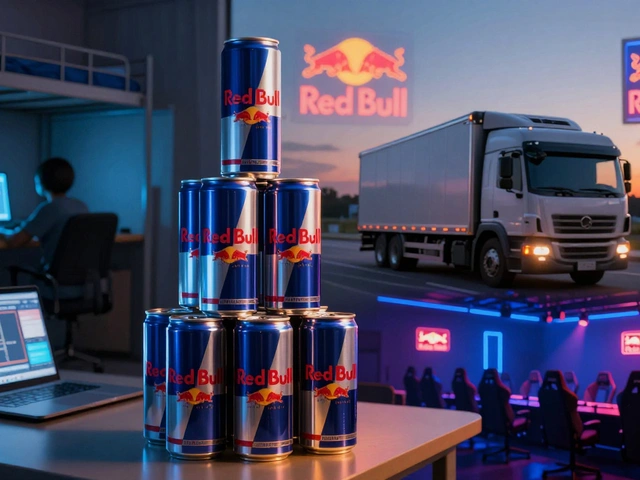
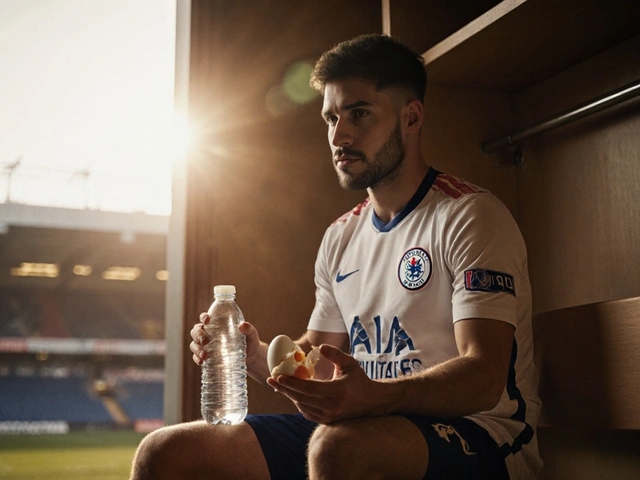
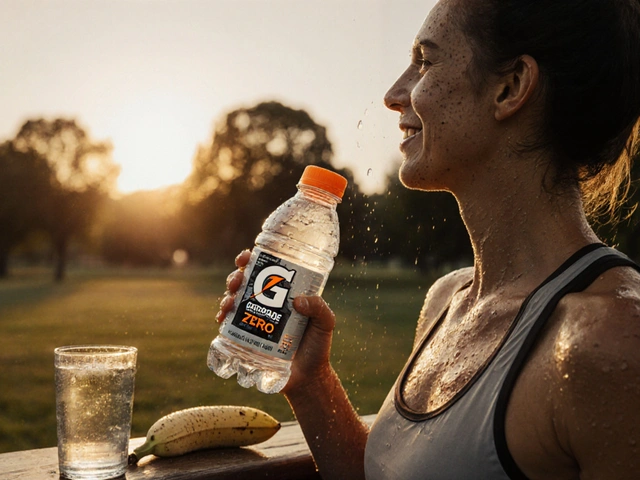

Comments (9)
sonny dirgantara
10 Nov 2025
lol i just drank one of these yesterday and now my heart feels like it’s doing the cha-cha
Johnathan Rhyne
12 Nov 2025
Let’s be real - the real villain here isn’t V, it’s the fact that we’ve turned every damn human into a caffeine-addled zombie who thinks ‘energy’ means ‘chemicals in a can.’
Also, the WHO sugar limit? That’s based on a 2,000-calorie diet. Most of us are living on 3,500 calories and three energy drinks. So technically, I’m not breaking the rules - I’m just optimizing for maximum chaos.
And before you say ‘but sugar is bad’ - tell that to my morning croissant. Or my 3 p.m. donut. Or the entire goddamn food industry that’s been selling us poison since 1982 and calling it ‘convenience.’
Also, ‘artificial colors’? Please. We’ve been eating dyed cereal since we were toddlers. Tartrazine is the least of our worries. The real issue? We’re addicted to quick fixes because we’ve forgotten how to rest.
And don’t even get me started on ‘zero sugar’ versions. Sucralose is basically the ghost of sugar - it haunts your taste buds and makes you crave more. It’s not healthier. It’s just a more expensive kind of betrayal.
Also, why does every article on this topic sound like a lecture from a yoga instructor who’s never had a 4 a.m. deadline? Chill. One can. Not a lifestyle. It’s not the end of the world. It’s just… a very loud, sugary, slightly neon mistake.
And yes, I’m the guy who drinks it on Fridays. Don’t judge me. I’m just trying to survive capitalism with a sense of humor.
Jawaharlal Thota
12 Nov 2025
Listen, I know this sounds like a lecture, but I’ve seen too many young people in my office burn out from these drinks - not because they’re evil, but because they think they have no other choice.
When I was in college, I used to down three cans before finals. I thought I was being productive. Turns out, I was just running on fumes and sugar crashes.
What changed? I started drinking green tea. Not because it’s ‘healthy’ - because it’s quiet. It doesn’t scream at your nervous system. It just… sits with you. Calm. Warm. Real.
And yeah, the water thing? Totally true. Most of the time, when I feel tired, I just drink a glass of water. Five minutes later, I’m awake. No crash. No jitters. Just… presence.
It’s not about banning V. It’s about remembering that your body isn’t a machine that needs fuel. It’s a living system that needs care.
Try replacing one can a week with a walk. Or a nap. Or a conversation with someone who doesn’t talk about productivity.
You’ll be surprised how much energy you already have - you just forgot how to listen to it.
Lauren Saunders
13 Nov 2025
Oh, please. This is such a performative wellness narrative wrapped in a faux-scientific bow.
Let’s not pretend that ‘real energy’ comes from ‘green tea’ and ‘10-minute walks’ - as if we’re all living in a Whole Foods aisle with a yoga mat and a journal.
The truth? People drink V because they’re overworked, underpaid, and sleep-deprived. And you want them to ‘just drink water’? Cute.
Also, ‘artificial sweeteners alter gut bacteria’ - cite the study. Not just ‘some studies.’
And while we’re at it, let’s not forget that coffee is also ‘highly processed’ - except somehow it’s the OG energy drink while V is the villain?
Also, the ‘crash’? That’s called being human. We’re not designed to be perpetually alert. We’re designed to cycle - sleep, eat, rest, work. But capitalism doesn’t care about your circadian rhythm.
So yes, V is full of junk. But the real problem isn’t the drink - it’s the world that makes you think you need it to survive.
Andrew Nashaat
13 Nov 2025
Okay, first - you said ‘32 grams of sugar (about 8 teaspoons)’ - that’s wrong. It’s 8 teaspoons of granulated sugar, but sugar is 4 grams per teaspoon, so 32g = 8 tsp - correct. Good.
Second - ‘80 mg of caffeine’ - that’s not ‘roughly’ - it’s EXACTLY 80 mg per 250ml can. You didn’t even check the label.
Third - ‘artificial colors like Tartrazine and Allura Red’ - yes, but you didn’t mention that they’re approved by the FDA and EFSA - so calling them ‘synthetic additives’ like they’re poison is misleading.
Fourth - you said ‘two cans = 64g sugar’ - true - but did you mention that a 20oz Coke has 65g? So V is actually BETTER than soda? Wait - no, you didn’t.
Fifth - ‘300 reports to the FDA’ - those are VOLUNTARY reports - not confirmed causations. People report ‘heart palpitations’ after eating chocolate - does that mean chocolate causes cardiac arrest?
Sixth - ‘dentists report 40% increase’ - in what population? How many subjects? What was the control group? You didn’t say.
Seventh - ‘twice as likely to report depression’ - correlation ≠ causation. Maybe depressed people drink more V because they’re tired?
Eighth - ‘children and teens’ - yes, but what about sports drinks? They have more sugar. Why aren’t you screaming about Gatorade?
Ninth - ‘zero sugar is worse’ - no, it’s not. It has 0g sugar. That’s objectively better. You’re just scared of sucralose because you think ‘chemical’ = ‘evil.’
Tenth - ‘your body will thank you’ - no, it won’t. It will thank you if you stop drinking sugar water. But V is not the enemy. The enemy is the idea that one drink is a moral failure.
Also - ‘brushing your teeth with sand’ - that’s not even a real analogy. Sand doesn’t dissolve. Sugar does. You’re being dramatic for clicks.
And yes - I’m the guy who drinks V every Tuesday. And I’m 34, and I’ve never had a health problem. So maybe - just maybe - moderation isn’t the problem. The problem is fear-mongering disguised as science.
Gina Grub
14 Nov 2025
It’s not about V.
It’s about the collapse of the American work ethic.
People don’t drink V because they like it.
They drink it because their jobs demand it.
Because sleep is a luxury.
Because ‘hustle’ is the new god.
Because the system doesn’t pay you to rest.
So you buy a can of neon liquid to pretend you’re not dying.
And then you’re told you’re weak.
For drinking the poison.
That’s not a health crisis.
That’s a moral failure of capitalism.
Nathan Jimerson
15 Nov 2025
I used to drink two cans a day. Then I started waking up at 5 a.m. and going for a walk. No coffee. No drink. Just me and the sunrise.
It took a week to adjust. My body didn’t like it at first. But after that? I felt clearer. Calmer. Less wired.
I still have V sometimes - on road trips or after a late night. But now it’s a treat, not a tool.
Real energy isn’t in a can. It’s in your breath. Your movement. Your quiet moments.
You don’t need to fix everything at once. Just one change. One day. One glass of water before the can.
You’ll be surprised how far that goes.
Sandy Pan
15 Nov 2025
What is energy, really?
Is it the spike? The rush? The chemical lift?
Or is it the quiet hum of a body that’s been respected?
We’ve turned vitality into a product - something to be consumed, optimized, hacked.
But energy isn’t a resource you extract.
It’s a rhythm you cultivate.
V doesn’t give you energy.
It steals your attention from the things that actually sustain you - sleep, stillness, food that doesn’t come in a can.
We’re not broken because we drink V.
We’re broken because we’ve forgotten how to listen.
And the worst part?
We’ve been sold the lie that we need to fix ourselves - when the system is the one that’s sick.
Eric Etienne
16 Nov 2025
Look. I don’t care if it’s bad for you. I’m not gonna stop drinking it.
It’s cheap. It tastes like candy. It wakes me up.
My body’s fine.
And if you’re gonna judge me for it, go drink your green tea and call me when you’ve paid your rent.